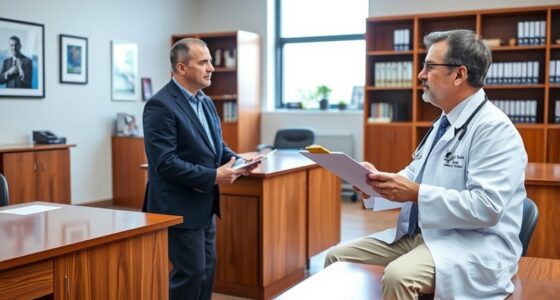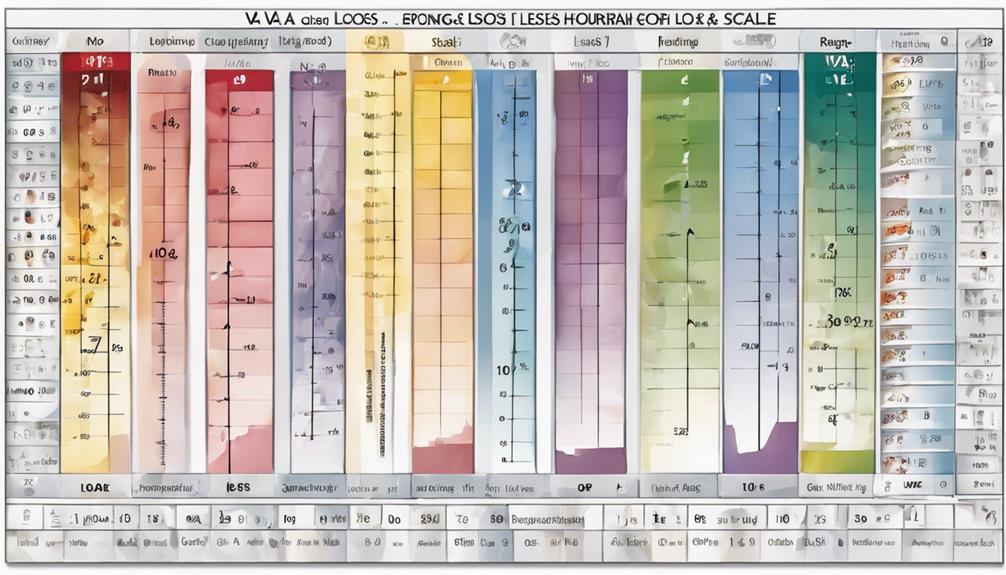When you visit a VA audiology clinic, you’ll start by discussing your hearing concerns, lifestyle, and symptoms like tinnitus with friendly staff. Then, you’ll undergo hearing tests in soundproof booths, responding to tones across different frequencies. A specialized tinnitus evaluation may also be done. After the assessments, the audiologist explains your results clearly and discusses options like hearing aids or sound therapy. Keep going to find out more about how your visit is tailored to your needs.
Key Takeaways
- Staff greet you warmly and discuss your hearing concerns, symptoms, and lifestyle to personalize your visit.
- You undergo hearing tests in soundproof booths to assess your hearing ability across different frequencies.
- If experiencing tinnitus, a specialized evaluation helps determine severity and management strategies like sound therapy.
- Results are explained clearly, with recommendations for follow-up, hearing aids, or other treatments based on your needs.
- You receive guidance on device care, hearing protection, and lifestyle adjustments to maintain and improve your hearing health.

Walking into a VA audiology clinic, you’ll find a welcoming environment dedicated to addressing hearing health. The staff is friendly and professional, ready to guide you through each step of your visit. Your first stop is usually a consultation where the audiologist asks about your hearing concerns, lifestyle, and any symptoms like ringing in your ears. This conversation helps them understand your unique needs and set the stage for the assessments to come.
A friendly VA audiologist guides you through your hearing health journey with personalized care and support.
Next, you’ll undergo a series of hearing assessments. These tests are essential for determining your level of hearing loss and identifying any specific issues. You’ll sit in a soundproof booth and wear headphones as the audiologist plays various tones and sounds at different frequencies and volumes. You’ll be asked to press a button or raise your hand whenever you hear a tone. This straightforward process provides precise data about your hearing ability across a range of sounds. The results help the audiologist craft a personalized treatment plan and determine if hearing aids are needed or if other interventions might be appropriate.
If you’re experiencing tinnitus, the clinic offers specialized tinnitus management. This might involve a detailed evaluation of your tinnitus symptoms, including when it occurs and how bothersome it is. The audiologist may discuss various management strategies, such as sound therapy, counseling, or coping techniques, to help you better tolerate the ringing or buzzing in your ears. They might also explore whether your tinnitus is linked to hearing loss, which is often the case, and recommend hearing aids or sound generators that can mask or reduce the perception of tinnitus.
Throughout your visit, the audiologist will explain what the test results mean in plain language, guaranteeing you’re fully informed about your hearing health. If needed, they’ll recommend follow-up appointments or specific treatments. Many clinics also offer education on hearing protection and lifestyle adjustments to prevent further hearing damage. Additionally, understanding the importance of contrast ratio in hearing devices can help you make informed choices about amplification options.
The appointment wraps up with a discussion of your options. If hearing aids are recommended, the audiologist will help you choose the right model and fit. For tinnitus, they’ll work with you to develop a management plan tailored to your needs. Before you leave, you’ll receive instructions on how to care for your hearing devices or implement strategies discussed during your visit. Rest assured, the entire process is designed to be thorough yet comfortable, with your hearing health prioritized at every step. The goal is to ensure you leave with a clear understanding of your hearing status and confidence in managing your hearing or tinnitus concerns effectively.
Frequently Asked Questions
How Long Does a Typical Audiology Appointment Last?
A typical audiology appointment usually lasts about 1 to 2 hours, depending on your exam length and specific needs. During this time, you’ll undergo various tests, such as hearing assessments and ear examinations. The appointment duration can vary based on factors like the complexity of your case and whether you need additional evaluations. Be prepared for a thorough exam, and plan to set aside enough time for the full appointment.
Can I Bring a Family Member to My Appointment?
Ever wonder if you can bring a family member along? Absolutely! The appointment policy encourages family member accompaniment because it helps provide support and guarantees everyone’s on the same page. You’re welcome to bring one or more loved ones to your VA audiology appointment. Just let the staff know ahead of time so they can accommodate your needs. Your loved ones can help clarify questions and share important information during your visit.
Are Walk-Ins Accepted or Appointment-Only?
You might wonder if the VA audiology clinic accepts walk-ins or if you need to schedule an appointment. Most clinics prefer appointment scheduling to ensure timely care, but some do have a walk-in policy for urgent cases. It’s best to call ahead to verify, as walk-ins are often accommodated depending on staff availability. Planning ahead helps you get the care you need without unnecessary delays.
What Should I Bring to My Audiology Visit?
Think of your audiology visit like preparing for a journey—bring what you’ll need to navigate smoothly. You should bring your current hearing aids, if you have any, along with a list of questions about hearing aid options and your hearing concerns. Also, bring your insurance card and a list of medications. This helps the audiologist perform thorough testing procedures and recommend the best solutions for your hearing health.
Will I Need Follow-Up Visits After the Initial Exam?
After your initial exam, you might need follow-up scheduling for further assessments or hearing aid adjustments. The audiologist will evaluate your hearing results and determine if additional visits are necessary to fine-tune your hearing aids or address ongoing concerns. These follow-up visits guarantee your hearing aids work effectively and your hearing health improves. Be sure to ask about the recommended schedule so you’re prepared for future appointments.
Conclusion
Visiting a VA audiology clinic is like stepping into a well-orchestrated symphony, where each step guarantees you get the care you need. From your initial check-in to the final hearing test, you’re guided through a smooth process designed to improve your hearing health. Remember, your audiologist is there to support you every step of the way. With their expertise and your cooperation, you’ll leave feeling confident your hearing is in good hands.











